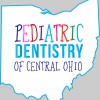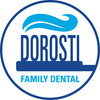
Our office is located in Pickerington, OH. The goal of Dr. Joshua Leavitt and his staff is to provide pediatric dental care in a caring and compassionate manner for infants, children, adolescents, and patients with special needs. Positive dental visits at an early age last a lifetime! We attempt to provide pleasant visits for child patients from a very early age.
Therefore, it is important to establish a dental home by the child's first birthday. Dr. Leavitt began his formal education at the University of Nevada, Las Vegas where he obtained his undergraduate and dental degrees. He received his certificate of specialized training in pediatric dentistry from The University of Toledo Medical Center. He also completed a masters degree in Oral Biology from the University of Toledo.
For infants, the first visit is similar to a well-baby check-up at the pediatrician. The child usually sits on the parent's lap in a knee-to-knee position. Toddlers sometimes sit in the dental chair by themselves or on their mom or dad's lap if they need a little more support.
Therefore, it is important to establish a dental home by the child's first birthday. Dr. Leavitt began his formal education at the University of Nevada, Las Vegas where he obtained his undergraduate and dental degrees. He received his certificate of specialized training in pediatric dentistry from The University of Toledo Medical Center. He also completed a masters degree in Oral Biology from the University of Toledo.
For infants, the first visit is similar to a well-baby check-up at the pediatrician. The child usually sits on the parent's lap in a knee-to-knee position. Toddlers sometimes sit in the dental chair by themselves or on their mom or dad's lap if they need a little more support.
Services
As a father of 5 children, Dr. Leavitt has first-hand experience working with children and knows the fears and anxieties that many children have towards a dental visit.
His personal goal is to help all children have a long term healthy relationship with a dentist throughout their lives.
To accomplish this goal, it is important to have children feel as comfortable as possible in the dental setting.
Dr. Leavitt began his formal education at the University of Nevada, Las Vegas where he obtained his undergraduate and dental degrees.
His personal goal is to help all children have a long term healthy relationship with a dentist throughout their lives.
To accomplish this goal, it is important to have children feel as comfortable as possible in the dental setting.
Dr. Leavitt began his formal education at the University of Nevada, Las Vegas where he obtained his undergraduate and dental degrees.
For your convenience, our doctors are providers for most major dental insurance plans.
Visa and Mastercard are accepted, and we offer payment plans through Care Credit.
Our staff helps parents interpret insurance plans and are able to estimate dental benefits.
Insured as well as non-insured costs can be calculated.
It is important to bring your current insurance card and information to the office on the first visit.
Please feel free to contact our staff with any questions about your insurance claims or coverage.
Visa and Mastercard are accepted, and we offer payment plans through Care Credit.
Our staff helps parents interpret insurance plans and are able to estimate dental benefits.
Insured as well as non-insured costs can be calculated.
It is important to bring your current insurance card and information to the office on the first visit.
Please feel free to contact our staff with any questions about your insurance claims or coverage.
A. A pediatric dentist specializes in the oral health care needs of children from infancy through the teenage years.
The education of a pediatric dentist involves two to three years of advanced training after four years of dental school.
The pediatric specialist has additional training in behavior guidance and techniques such as sedation that can be used to comfort an anxious child patient.
When children have multiple cavities at a very young age, have special needs or are not ready to accept dental care in an office setting; the pediatric dentist has learned to complete treatment in the operating room.
The education of a pediatric dentist involves two to three years of advanced training after four years of dental school.
The pediatric specialist has additional training in behavior guidance and techniques such as sedation that can be used to comfort an anxious child patient.
When children have multiple cavities at a very young age, have special needs or are not ready to accept dental care in an office setting; the pediatric dentist has learned to complete treatment in the operating room.
A toothache can occur from: a deep cavity, an oral ulcer, dental trauma, a gum problem, a loose baby tooth or from something stuck between the teeth.
Be sure to keep the area clean.
Bleeding should be controlled by holding a clean gauze or wash cloth over the area for at least five full minutes.
If bleeding does not stop, please call our office or an emergency room.
Make sure that the child's DPT (Diphtheria, Pertussis, Tetanus) injection series is current.
Contact our office immediately as quick action can save the tooth.
Be sure to keep the area clean.
Bleeding should be controlled by holding a clean gauze or wash cloth over the area for at least five full minutes.
If bleeding does not stop, please call our office or an emergency room.
Make sure that the child's DPT (Diphtheria, Pertussis, Tetanus) injection series is current.
Contact our office immediately as quick action can save the tooth.
The laser is a device that is changing dentistry.
Fillings can be completed without the use of dental injections.
Children who fear needles can receive treatment without a "shot."
This technique almost totally eliminates the possibility that patients will bite their lips after traditional treatment with local anesthesia.
The laser creates a light beam of energy.
The beam mixes with a stream of water.
This "charged" water removes the decay.
Children can eat immediately and often don't even need pain control medications after the procedure.
Fillings can be completed without the use of dental injections.
Children who fear needles can receive treatment without a "shot."
This technique almost totally eliminates the possibility that patients will bite their lips after traditional treatment with local anesthesia.
The laser creates a light beam of energy.
The beam mixes with a stream of water.
This "charged" water removes the decay.
Children can eat immediately and often don't even need pain control medications after the procedure.
Reviews

Be the first to review Richard Loochtan.
Write a Review

